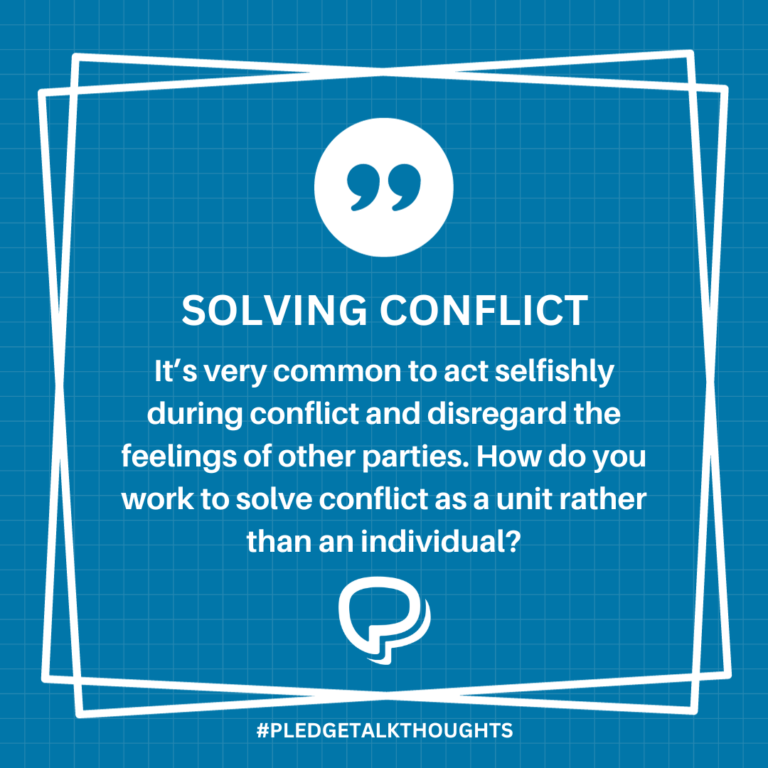Further Thoughts on: Do You Fight With or Against Each Other When in Conflict?
(CLICK HERE to watch the short video!)
Picture the last argument you experienced. You were facing each other pointing out how you were right and the other was wrong. My guess is the conversation didn’t go very well. In fact, most likely it went from bad to worse – and you wondered why.
Now picture yourself going back in time to that same argument. Before you start the argument – or as soon as you realize an argument has ensued – STOP.
Look at the person in front of you. Do they matter to you? How much? And why? Likely they matter a great deal. Good. Taking this moment to remind yourself of how much they matter can help you with the next few steps.
Think: that person is not your problem. There obviously is a problem or you wouldn’t be in conflict. But that PERSON is not the problem. Neither are you.
Keep thinking: picture the problem as being “out there” that you both have to work on. It is something that happened that needs to be looked at and addressed. Rarely does either party do or say to purposely hurt the other. (And if they did, you have another problem!) Now envision turning away from each other and sitting side by side to look instead towards the problem.
First: decide what is the PROBLEM.
In most conflicts, the PROBLEM is some form of miscommunication.
- Someone wasn’t listening fully
- One of you feels misunderstood
- A tone was used or a word spoken that was hurtful
- Someone reacted before you were able to explain fully
The PROBLEM could also be some degree of polarization of ideas. Read my ideas on this from last week’s blog post and video by CLICKING HERE. The shortened version is this: when it comes to issues that divide us, we must recognize that we each have arrived at our own views over the course of time based on numerous inputs or experiences. Thus, if we hope to influence someone to view an issue differently, we must keep in mind it will take time, understanding, and different inputs or experiences to possibly persuade them. This requires great patience and the pursuit of relationship over recruitment!
And in most cases, at least to some degree, the PROBLEM stems from sheer self-serving interest.
- In most conversations, and especially conflict, we default to looking first after our own interests. Unfortunately, when and as we do, it most often leads to poorer communication, more conflict, and an inability to resolve it when it happens.
- In PLEDGEtalk we speak of the underlying motive for good, healthy, and helpful conversation – being that of love. Saying it another way, we must choose to place the idea of serving others above ourselves. This is similar to what I just wrote, that we must make the pursuit of relationship, more important than the pursuit of recruiting people to see things our way.
Second, after we have determined to at least some degree, what the PROBLEM really is, we turn side by side to work on the problem.
Image by Tomas Gomez from Pixabay
I am not saying we literally no longer talk face-to-face. If that helps great, if not, fine. What I am saying is, together, work on the PROBLEM – not “work” on the other PERSON. And to do so we use the PLEDGEtalk process to guide the conversation with the motive of love, putting the other person first with each step of PLEDGE.
Recently I was frustrated at Zerrin over how she wanted to spend our evening – and it caused some conflict.
We both felt it. So we STOPPED – or in PLEDGEtalk language, we Paused. Doing so gave me some time to reflect. As I did, I realized I was making some assumptions about Zerrin and judgments. I had to admit to myself, I didn’t know if they were true or not but I could feel a lot of emotional energy around them. As I continued to reflect, I began to think of how we are just different. When we have free time in the evening, she might want to spend it one way, and I another – because of views and ideas about time and life that are different. Not wrong, just different.
Upon understanding the above, I sensed the negative emotional energy draining away and I was able to see the PROBLEM for what it was – and that it wasn’t the PERSON of my wife. This set us up for a later conversation where we shared our thoughts and life experiences leading to some greater understanding and appreciation of each other with no harm done to each other in the way we related. Quite the contrary, love was experienced and greater connection as a result.
When in conflict we must learn to fight WITH each other on the problem itself, not AGAINST each other as if the person is the problem!
Comments? Thoughts? Reflections? I’d love to hear them below!





Leave a Reply
Want to join the discussion?Feel free to contribute!